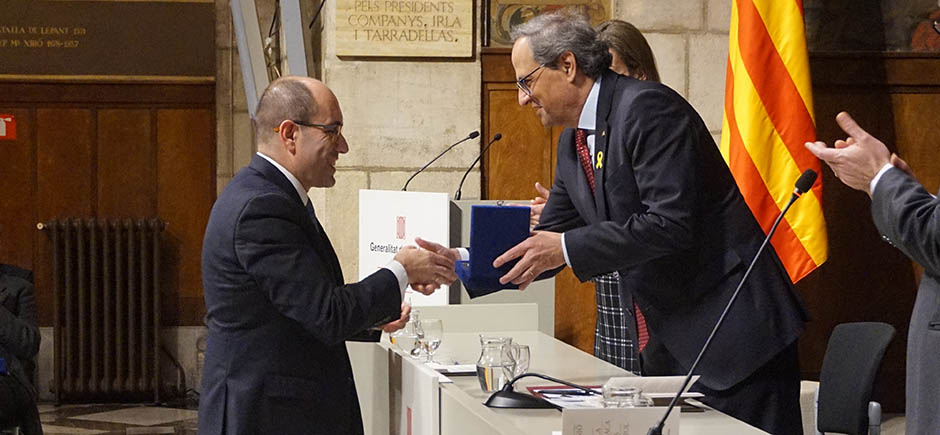The award recognises the contributions of the Director of ICN2 to the advancement of Science and Technology in Catalonia. In the ceremony held today at the Palau de la Generalitat, the Narcis Monturiol awards were handed by the President of the Generalitat de Catalunya to nineteen renowned scientists and one institution. This 23rd edition coincides with the 200th anniversary of the birth of this influential engineer born in Figueres.

The Narcís Monturiol awards recognised today the outstanding contributions of nineteen researchers and one institution to several fields of science and technology in Catalonia. Among the awardees was the ICN2 Director, Prof. Pablo Ordejón. Regarding this honour he explained that “I am proud to receive such a recognition, and very thankful for having been part of the advancement of science in Catalonia though the work I shared with so many people. I owe and share this award with all my colleagues at the ICN2, the ICMAB and other institutions I had the privilege to collaborate with”.
The President of the Generalitat de Catalunya (Catalan Government), Quim Torra, presided today the ceremony to celebrate the 23rd edition of the awards. The event, held at the Palau de la Generalitat, was attended by a nourished representation of the Catalan Government, including the Catalan Minister of Business and Knowledge, Àngels Chacón, and the Secretary for Universities and Research, Ministry of Business and Knowledge, Government of Catalonia, Francesc Xavier Grau, both members of the ICN2 Board of Trustees.
Narcís Monturiol was born in 1819 in Figueres (Catalonia, Spain). He was the inventor of the first air-independent and combustion-engine-driven submarine and one of the most notorious science and technology Catalan figures. This award is thus a way to remind his historical contribution to the innovation spirit of the Catalan people.
The full list of awardees can be consulted at the Catalan Government website. We would like to congratulate all the awardees and look forward sharing new challenges and successes with them.
About Prof. Pablo Ordejon
Prof. Pablo Ordejon is a Research Professor of the Spanish National Research Council (CSIC). After obtaining his PhD at the Universidad Autónoma de Madrid, he spent three years in the United States as a postdoctoral research associate at the University of Illinois Urbana-Champaign. In 1995, he returned to Spain as an assistant professor at the University of Oviedo, and joined the Institute of Materials Science of Barcelona (ICMAB) in 1999, where he remained until moving across to the former Nanoscience and Nanotechnology Research Centre (CIN2). He has been director of the Catalan Institute of Nanoscience and Nanotechnology (ICN2) since its creation in 2012 and leads the ICN2 Theory and Simulation Group.
One of the principal investigators of the MaX Center of Excellence, a European initiative at the forefront of high performance and high throughput computing technologies, his current research interests include electronic, spin and heat transport in nanoscale devices, two-dimensional materials, chemical processes at surfaces and electrochemistry, among others. He has published over 200 scientific articles (and counting), which have so far been cited over 30,000 times. He is also one of the original creators of the SIESTA code, a tool to perform atomistic simulations of materials used all over the world. He also is a co-founder of the spinoff SIMUNE, which provides computer simulation services to companies developing innovative and cutting-edge technology based on the properties of materials at the atomic scale.
Under his direction, the ICN2 has been awarded the Severo Ochoa Centre of Excellence accreditation by the Spanish Ministry of Education, Industry and Competitiveness for two consecutive four-year periods (2014-2018 and 2018-2022), and become a founding member of the Barcelona Institute of Science and Technology (BIST). In 2017 he was invited to join the Academia Europaea, an organisation that brings together eminent European scientists and scholars from the full range of academic disciplines for the advancement of science and science education. He is a Fellow of the American Physical Society since 2005.

